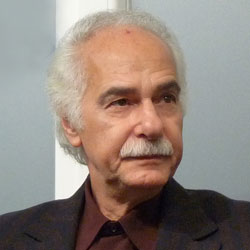Good morning sun of my land
how good it feels to be alive today
so much light
so much light around me
Good morning empty exercise yard
you have become familiar to me
I cross you with a lively step
and you suit me like an elegant shoe
Good morning ponderous and philosophical oxpecker
perched up there
on the wall that hides the world from me
poking at your ribcage
with distracted little movements
Good morning sparse grass in the alley
quivering in opalescent flurries
at the wind’s teasing touch
Good morning great lone palm
erect on your cross-grained trunk
blooming at your peak
like a glorious tulip
Good morning sun of my land
tide of presence abolishing exile
So much light
so much light around me
***
I have a thousand reasons to live
to vanquish day-to-day death
the joy of loving you
and walking in step with hope
***
Notes on the Poem
"Good Morning Sun of My Land" is another inspirational selection from In Praise of Defeat, a collection of the work in French of poet, novelist, playwright, translator, and political activist Abdellatif Laâbi, translated by Donald Nicholson-Smith. In Praise of Defeat was shortlisted for the 2017 Griffin Poetry Prize. As we observed in a previous selection from this collection, Abdellatif Laâbi's experience of political imprisonment and exile deeply informs and permeates his work. As the 2017 judges acknowledge, this is so well communicated in English by Laâbi's dedicated translator Nicholson-Smith, and the exercise was clearly an epic labour of love for him. The use of repeated words and phrases as mantras aiding in his survival appears again here, as it did in "Chronicle of the Citadel of Exile". "Good morning" and "so much light" are deployed with determined positivity. Again, the poem is absent of punctuation, but each "Good" of "Good morning" is pointedly capitalized (as "Bonjour" is capitalized in the original text in French). The "empty exercise yard" illustrates that he is dealing with both imprisonment and further enforced isolation, but he contends with that by anthromorphizing the things around him, including the yard itself. How fortunate that another living creature that shares this space with him is the oxpecker, a bird native to sub-Saharan Africa that is related to starlings and mynahs - talkers, even if they are "ponderous and philosophical". As Laâbi brings his confined space to life and sheds light on it, he also introduces traces and suggestions of colour, culminating in the comparison of the "great lone palm" to "a glorious tulip". Tulips conjure many colours, all of them symbolizing hope and love, which segues beautifully to the quatrain concluding this selection. In this poem, Laâbi has truly generated a "tide of presence abolishing exile".
